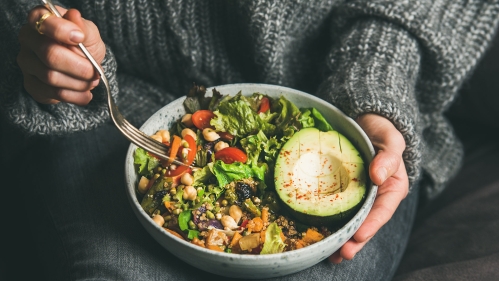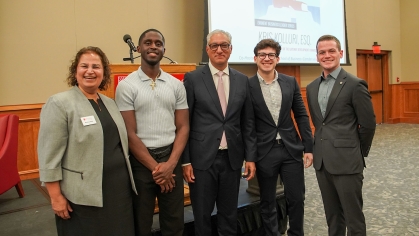Making plans to improve eating habits in the new year can turn into a dispiriting experience, but a Rutgers University‒Camden nutrition expert says having realistic expectations can make it a more pleasant and successful endeavor.
Taking stock of eating and drinking habits can help people make different choices for what they consume, and even drop some bad habits, says Kathy Jackson, a family nurse practitioner and Rutgers‒Camden clinical assistant professor of nursing. Evaluating and resetting food habits, she says, is beneficial to improve health in the short term and in the future.
“The best way to make enduring changes in eating is not to diet but to change eating habits,” Jackson explains.
Due to busy schedules, she continues, many people grab a bite whenever or wherever they can, often resulting in eating too much processed food that is high in fat, salt and sugar.

Kathy Jackson says eating a variety of foods and portion size are key to eating healthy.
“Think about eating mindfully,” says Jackson. “Take a bit of time to sit quietly – alone or with family, friends or colleagues – to really experience and enjoy your food.”
The Rutgers‒Camden researcher says a healthy diet revolves around eating unprocessed foods from the five basic food groups: vegetables; fruits; grains such as beans, nuts and whole grains; dairy; and proteins like fish, chicken and lean meats.
Research has shown that these approaches have benefits that include prevention of cardiovascular disease, cancer, type 2 diabetes and obesity.
While Jackson suggests following the U.S. Department of Agriculture’s MyPlate guidelines to eating healthy and limiting sugar consumption, you shouldn’t deprive yourself of sweets. Giving up an entire category of food is difficult to maintain, but an attainable goal is to indulge occasionally in a sweet treat that you really like, such as having one or two cookies, a small bowl of ice cream or one piece of pie. “The key is the portion size,” says Jackson.
She further cautions against skipping meals to consume fewer calories. Not eating for many hours can result in over-eating later in the day. She suggests pre-planning meals and packing healthy snacks, such as nuts and fruit to eat during the day.
Nonetheless, she adds, changing our behavior takes time. “Sticking to new eating habits is difficult, but don’t give up,” she says. “Forgive yourself when you have a setback, then get back on track on the healthy eating plan.”



